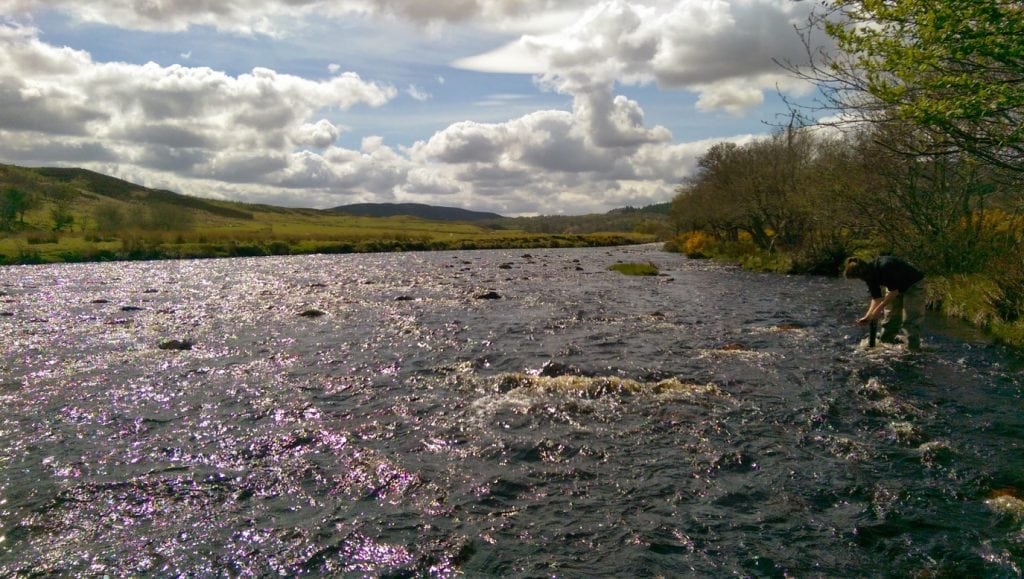Marine
Meet our scientists – Dr Faye Jackson
November 7, 2017 by Marine Scotland Communications No Comments | Category Marine Directorate general, Marine Directorate Science
Who are you and what do you do?
I am a new employee in the Environment Group at Marine Scotland Science Freshwater Fisheries Laboratory (MSS-FFL). I am currently undertaking large-scale (all of Scotland) spatial data analysis, using R as a GIS, to create national scale datasets of river habitat proxies e.g. elevation, river width, bankside woodland. These datasets are used as inputs for both our national juvenile density and river temperature models and allow predictions to be made for any river location in Scotland. I also contribute to the annual reporting for the ‘Scotland River Temperature Monitoring Network (SRTMN)’ and produce peer reviewed papers, reports and conference presentations. My most recent paper describes our national river temperature model which can simultaneously predict daily maximum river temperature and sensitivity to climate change for rivers across Scotland.
Why is what you do important?
MSS-FFL have been working for a many years on applied research questions that provide us with the knowledge base to create informed policy and management. Under environmental and climate change I believe this is even more important, allowing us to best manage and protect our rivers and fisheries. The national juvenile density model will allow the further development of assessment tools for salmon populations in Scotland.
What has your career path been – how did you get here?
I have always been interested in the environment and how we can protect it. In addition, I love learning and finding out new things, a career in science allows me to learn and discover every day. I have also been privileged to work with and learn from people from a range of different backgrounds and organisations throughout my career.
I completed a BSc Geography degree at the University of Birmingham specialising in hydrology, climate and environmental management. My undergraduate dissertation was focused on understanding how different water sources (e.g. glacial, groundwater, surface water) influenced river temperatures in the Taillon-Gabiétous catchment in the French Pyrenees. I further specialised in hydrology by completing an MSc at the University of Leeds entitled ‘Catchment dynamics and management.’ I remained interested in river temperatures and for my dissertation looked at the temperature dependence of in-stream respiration in the Ӧdenwinkelkees catchment in the Austrian Alps.
Next, I undertook a PhD with MSS-FFL and the University of Birmingham, funded by a NERC Open CASE studentship. My project focused on the development of novel monitoring and statistical modelling methods to understand and predict why river temperature varies at different locations and at different times. As part of this we designed and deployed the Scotland River Temperature Monitoring Network. I was particularly interested in this project because of the ‘real world’ application that meant that the research was going to be used in the management of Scotland’s rivers and fisheries. After my PhD I applied for the ‘Salmon Assessment Modeller’ post advertised at MSS-FFL and was thrilled that I was successful.
If you weren’t doing this, what do you think you would be doing instead?
I would (hopefully!) be a post-doctoral researcher at a university researching rivers under environmental and climate change (e.g. implications for thermal regime, water quality) and the consequences for fish populations. I would have endeavoured to maintain collaborative links with applied research organisations like MSS-FFL to ensure policy and management relevant scientific output.
What’s your favourite fishy fact?
I don’t have a fishy fact but I do have a temperature logger fact. A Gemini Tinytag datalogger (the loggers we use in SRTMN) can measure temperature every 15 minutes for 339 days and 17 hours before becoming full.
One fun fact about you
I love hillwalking, mountain biking and weightlifting.
Further Information
Tags: Education, research, STEM



Leave a comment